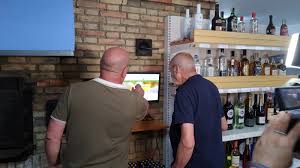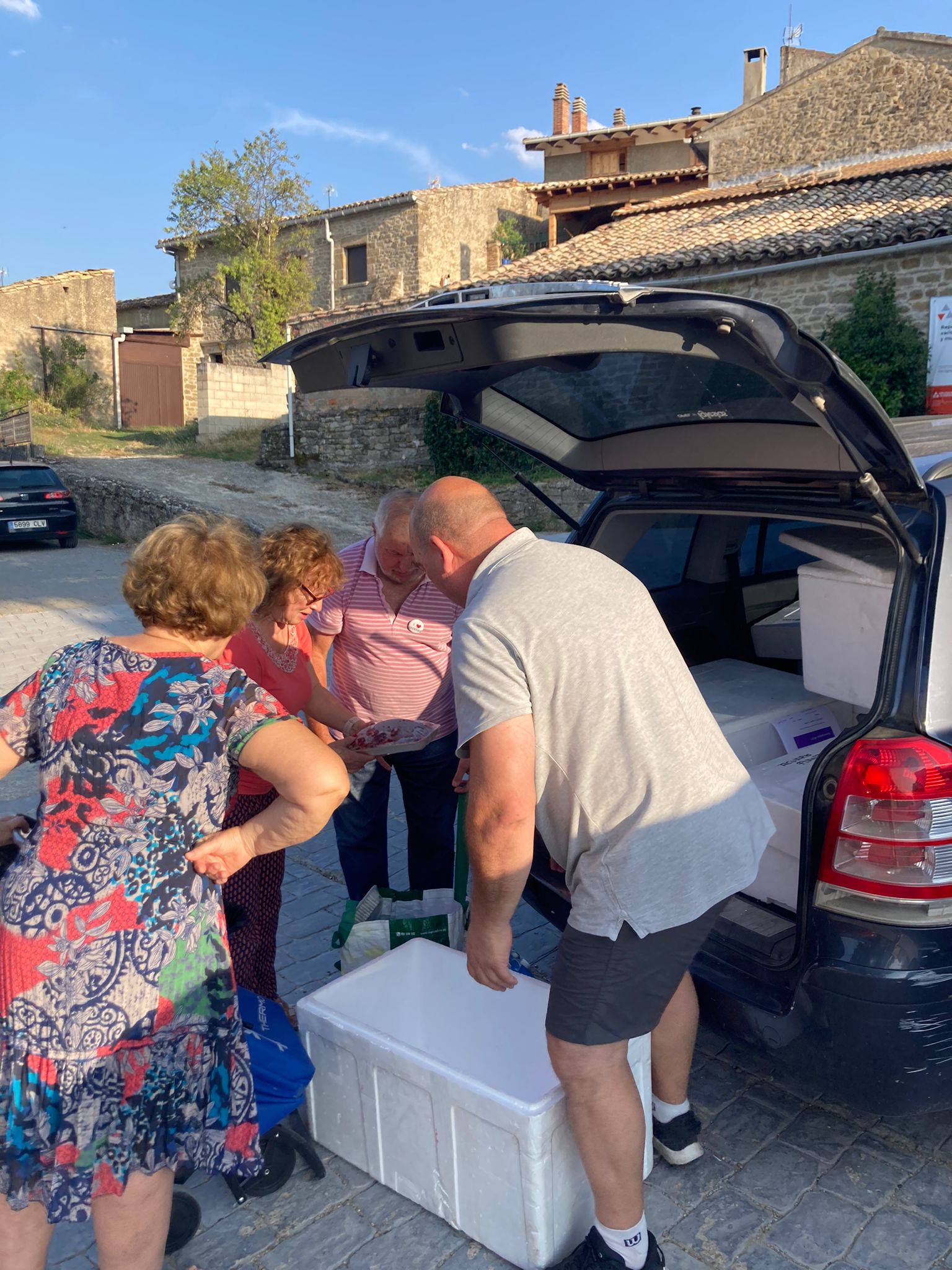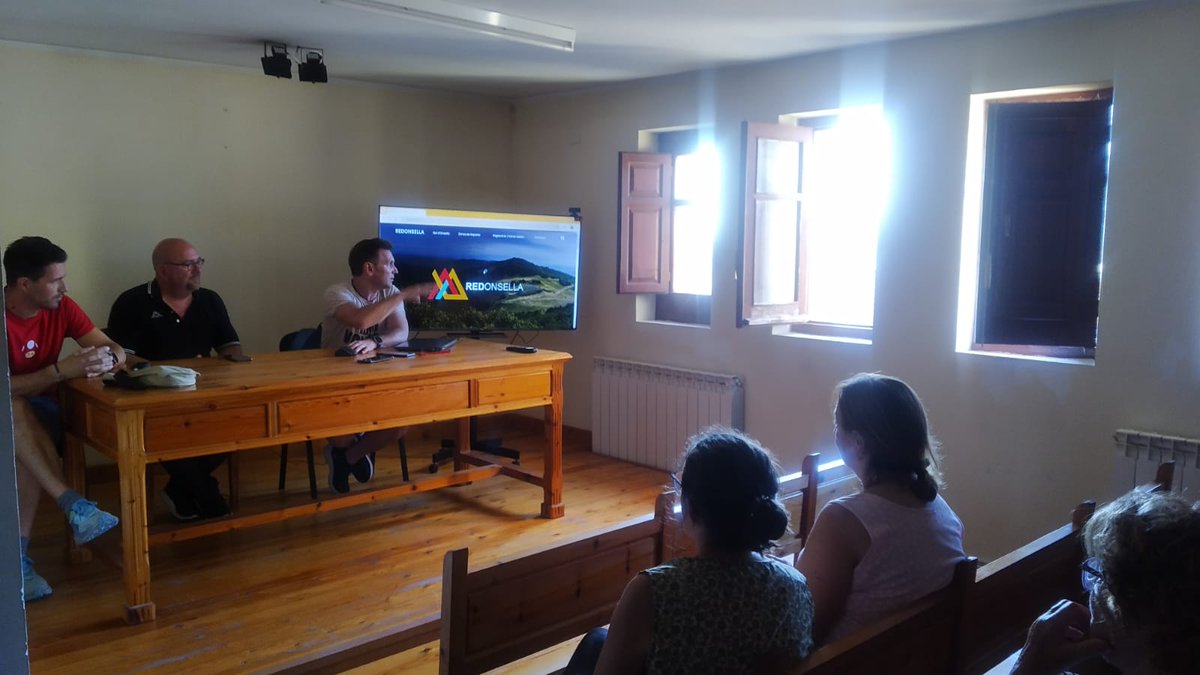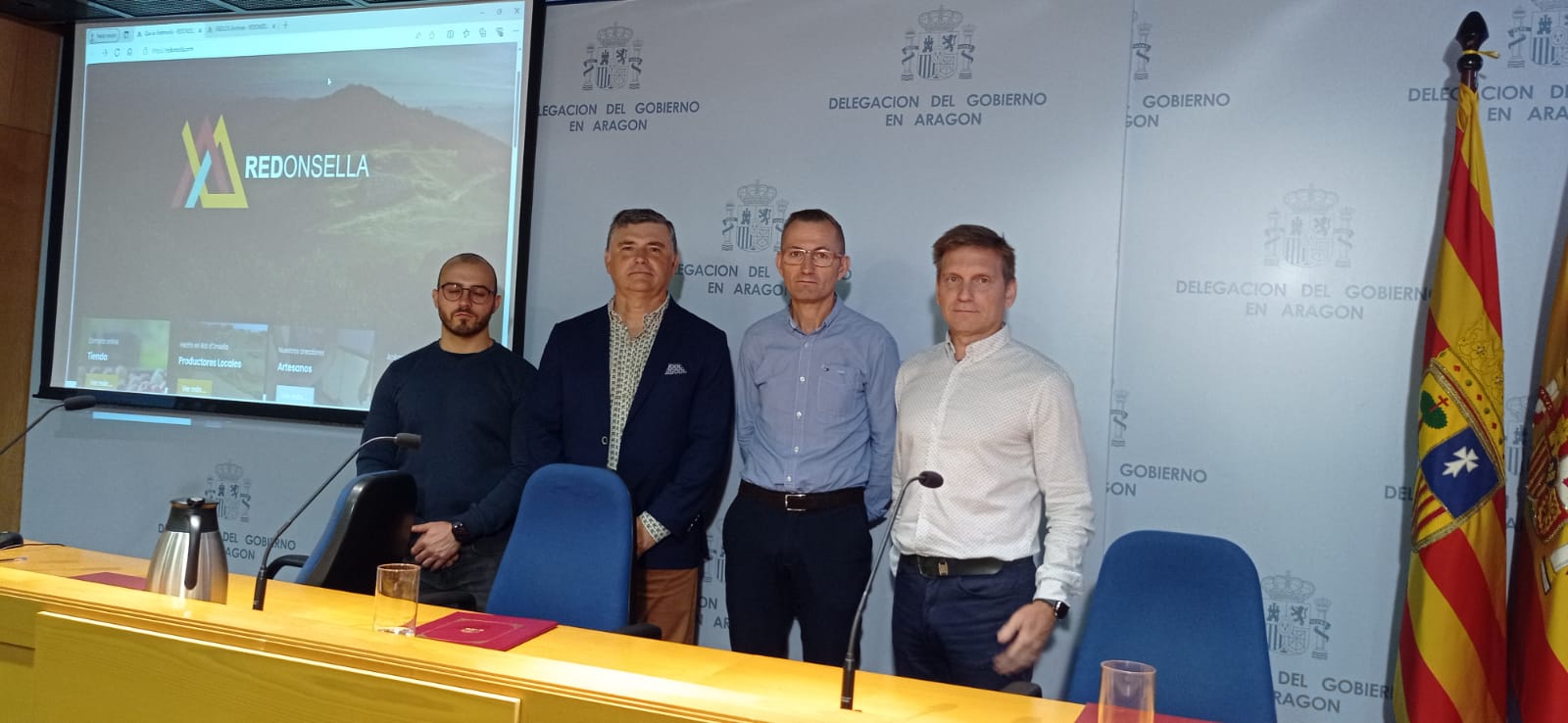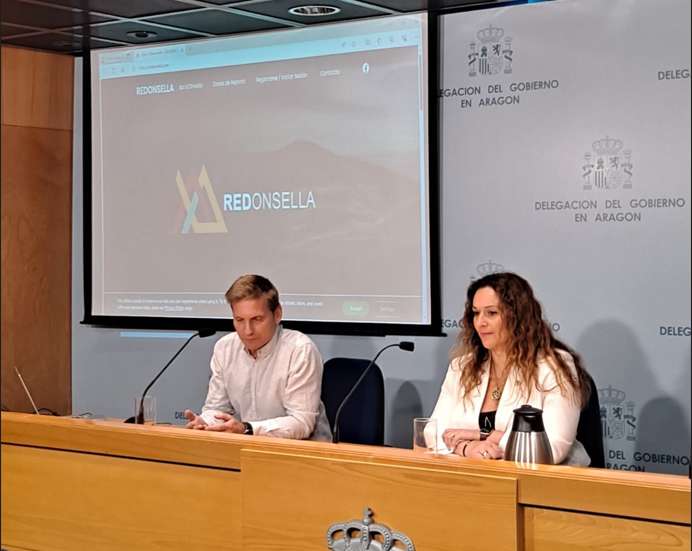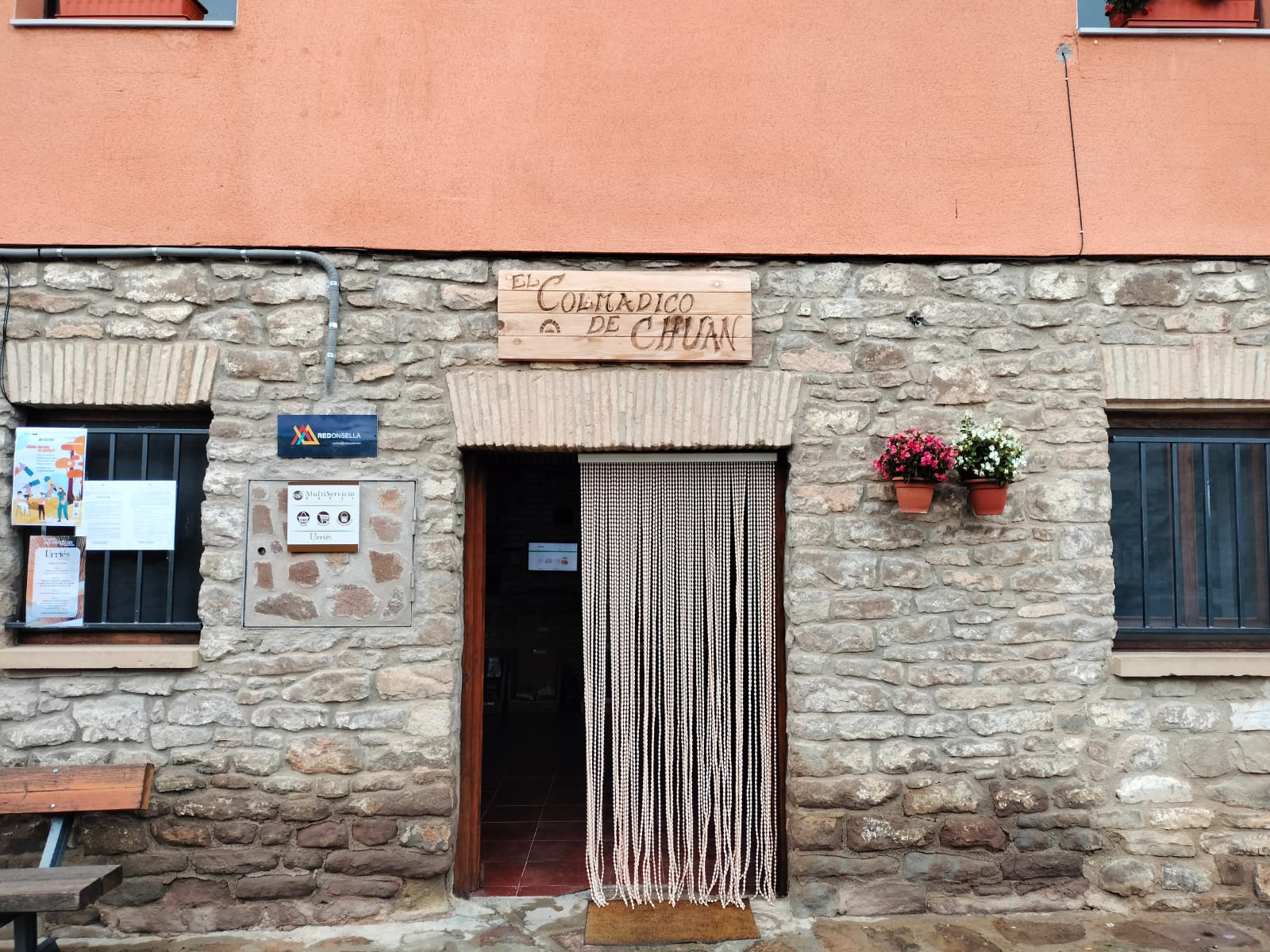Shaping a circular industrial ecosystem and supporting life-cycle thinking
RedOnsella
RedOnsella circular economy platform
It is a local technological infrastructure that adds the advantages of digitalization, to achieve economic, tourist revitalization and social well-being of the population of the Onsella Valley, in the Altas Cinco Villas of Zaragoza. An area with a population density below 1.5 inhabitants/km2 where the largest population does not reach 60 registered residents.
Spain
Regional
Aragón
Mainly rural
It refers to other types of transformations (soft investment)
Yes
2024-07-01
No
No
Yes
Yes
No
As a representative of an organisation
REDOnsella is a technological and social infrastructure that promotes sustainability and inclusion in the Onsella Valley (Zaragoza). Its model fosters circular economy, responsible consumption, and the digitalization of essential services in a rural area with low population density.
The project strengthens the social and economic fabric through a participatory process with municipalities, ensuring equal access to goods and services via a central store-warehouse and a digital shopping platform. Additionally, it supports local businesses with a rural marketplace, facilitates small producers, and creates smart routes to boost sustainable tourism.
REDOnsella stands out for its multilevel and transdisciplinary approach, integrating local governments, businesses, and citizens in its development. Its scalable and replicable design has attracted interest from other regions, proving its viability and implementation potential. To date, it serves six municipalities, generating employment, new business opportunities, and a social cohesion model that can be exported to other rural areas in Europe.
The social impact is more than evident in just two months of operation. In fact, the first to use this platform have been the older population. People who would otherwise have had to depend on third parties to
travel to the most essential purchases in some cases with more than an hour of travel to make them. It is still early to draw conclusions because it has coincided with the summer months and we will be able to analyze the true social and economic impact when the municipalities are once again left only with those registered, who on the other hand are the most dependent.
The project strengthens the social and economic fabric through a participatory process with municipalities, ensuring equal access to goods and services via a central store-warehouse and a digital shopping platform. Additionally, it supports local businesses with a rural marketplace, facilitates small producers, and creates smart routes to boost sustainable tourism.
REDOnsella stands out for its multilevel and transdisciplinary approach, integrating local governments, businesses, and citizens in its development. Its scalable and replicable design has attracted interest from other regions, proving its viability and implementation potential. To date, it serves six municipalities, generating employment, new business opportunities, and a social cohesion model that can be exported to other rural areas in Europe.
The social impact is more than evident in just two months of operation. In fact, the first to use this platform have been the older population. People who would otherwise have had to depend on third parties to
travel to the most essential purchases in some cases with more than an hour of travel to make them. It is still early to draw conclusions because it has coincided with the summer months and we will be able to analyze the true social and economic impact when the municipalities are once again left only with those registered, who on the other hand are the most dependent.
Inclusion
Sustainability
Circular Economy
Rural Revitalization
Digitalization
Key Sustainability Objectives of REDOnsella
REDOnsella integrates technology and infrastructure to revitalize the economy and improve life in the Onsella Valley, focusing on environmental, social, and economic sustainability.
Environmental Sustainability
Circular economy: Enables local producers to sell surplus goods, reducing waste.
Lower carbon footprint: Optimized distribution reduces individual travel and CO₂ emissions.
Digital efficiency: Minimizes paper use and unnecessary travel.
Social Sustainability
Accessibility and inclusion: Ensures access to essential goods, especially for elderly residents, with home deliveries and tech assistance.
Support for local businesses: Prioritizes purchases from local suppliers to strengthen the economy and prevent depopulation.
Community participation: Municipalities and associations shape the project, fostering social cohesion.
Economic Sustainability
Job creation: Generates employment in logistics and new rural businesses.
Entrepreneurship support: Provides a free marketplace for small producers, eliminating intermediaries.
Scalable model: Interest from other regions shows long-term viability and expansion potential.
Exemplary Model
REDOnsella merges technology, tradition, and community, aligning with the New European Bauhaus values. It’s a replicable solution for rural areas, fostering sustainable economic and social growth.
REDOnsella integrates technology and infrastructure to revitalize the economy and improve life in the Onsella Valley, focusing on environmental, social, and economic sustainability.
Environmental Sustainability
Circular economy: Enables local producers to sell surplus goods, reducing waste.
Lower carbon footprint: Optimized distribution reduces individual travel and CO₂ emissions.
Digital efficiency: Minimizes paper use and unnecessary travel.
Social Sustainability
Accessibility and inclusion: Ensures access to essential goods, especially for elderly residents, with home deliveries and tech assistance.
Support for local businesses: Prioritizes purchases from local suppliers to strengthen the economy and prevent depopulation.
Community participation: Municipalities and associations shape the project, fostering social cohesion.
Economic Sustainability
Job creation: Generates employment in logistics and new rural businesses.
Entrepreneurship support: Provides a free marketplace for small producers, eliminating intermediaries.
Scalable model: Interest from other regions shows long-term viability and expansion potential.
Exemplary Model
REDOnsella merges technology, tradition, and community, aligning with the New European Bauhaus values. It’s a replicable solution for rural areas, fostering sustainable economic and social growth.
Aesthetic and Cultural Experience in REDOnsella
REDOnsella is more than a technological infrastructure; it is a project deeply rooted in the cultural identity and heritage of the Onsella Valley. Through thoughtful design and a strong connection to local traditions, REDOnsella enhances the quality of life and fosters a sense of belonging among residents and visitors.
Aesthetic and Design Integration
Revitalizing Traditional Spaces: The project leverages existing rural structures, such as local shops and municipal spaces, transforming them into vibrant hubs for commerce, social interaction, and logistics.
User-Friendly Digital Platform: Designed with accessibility in mind, the app and digital tools feature intuitive interfaces adapted for all generations, ensuring inclusivity.
Cultural and Emotional Connection
Promotion of Local Craftsmanship: By creating a marketplace for artisans and local producers, REDOnsella preserves and promotes regional craftsmanship, strengthening cultural continuity.
Heritage-Based Tourism: The platform integrates smart tourism routes highlighting the valley’s rich history, landscapes, and traditions, offering immersive experiences that connect people to the region’s identity.
Intergenerational Knowledge Exchange: Incorporating oral histories, traditions, and local stories into the platform fosters deeper cultural appreciation and strengthens community ties.
An Exemplary Model
REDOnsella demonstrates how technology can enhance aesthetic and cultural experiences in rural areas. By merging digital innovation with heritage preservation and design quality, it serves as a replicable model for other communities aiming to create sustainable, culturally enriched environments.
REDOnsella is more than a technological infrastructure; it is a project deeply rooted in the cultural identity and heritage of the Onsella Valley. Through thoughtful design and a strong connection to local traditions, REDOnsella enhances the quality of life and fosters a sense of belonging among residents and visitors.
Aesthetic and Design Integration
Revitalizing Traditional Spaces: The project leverages existing rural structures, such as local shops and municipal spaces, transforming them into vibrant hubs for commerce, social interaction, and logistics.
User-Friendly Digital Platform: Designed with accessibility in mind, the app and digital tools feature intuitive interfaces adapted for all generations, ensuring inclusivity.
Cultural and Emotional Connection
Promotion of Local Craftsmanship: By creating a marketplace for artisans and local producers, REDOnsella preserves and promotes regional craftsmanship, strengthening cultural continuity.
Heritage-Based Tourism: The platform integrates smart tourism routes highlighting the valley’s rich history, landscapes, and traditions, offering immersive experiences that connect people to the region’s identity.
Intergenerational Knowledge Exchange: Incorporating oral histories, traditions, and local stories into the platform fosters deeper cultural appreciation and strengthens community ties.
An Exemplary Model
REDOnsella demonstrates how technology can enhance aesthetic and cultural experiences in rural areas. By merging digital innovation with heritage preservation and design quality, it serves as a replicable model for other communities aiming to create sustainable, culturally enriched environments.
Inclusion and Accessibility in REDOnsella
REDOnsella is built on the principle that digital innovation should leave no one behind. In a region with a population density of less than 1.5 inhabitants/km², accessibility, affordability, and inclusive governance are at the core of the project. By combining physical and digital infrastructure, REDOnsella ensures that all residents—regardless of age, digital literacy, or mobility—can access essential services, economic opportunities, and social engagement.
Key Inclusion Strategies
Universal Accessibility: A user-friendly digital platform, complemented by in-person support, allows elderly residents and those unfamiliar with technology to make online purchases, access services, and engage in local commerce. Public access points in municipal buildings ensure everyone can participate, even without personal internet access.
Affordability for All: REDOnsella eliminates transportation costs for deliveries, ensuring equitable access to goods regardless of order size or location. This is particularly impactful for low-income and elderly residents who face mobility challenges.
Inclusive Governance: The project operates through a collaborative model where municipalities, local businesses, and residents actively contribute to decision-making. This participatory approach ensures that solutions align with community needs.
Empowering Local Businesses: By providing a free marketplace and logistics support for rural entrepreneurs, artisans, and farmers, REDOnsella strengthens local economies, particularly benefiting women-led and small-scale businesses.
An Exemplary Model
REDOnsella demonstrates how inclusion can be woven into a digital ecosystem. By integrating accessibility, affordability, and participatory governance, it creates a socially sustainable model that can be replicated in other rural areas, fostering economic resilience and community well-being.
REDOnsella is built on the principle that digital innovation should leave no one behind. In a region with a population density of less than 1.5 inhabitants/km², accessibility, affordability, and inclusive governance are at the core of the project. By combining physical and digital infrastructure, REDOnsella ensures that all residents—regardless of age, digital literacy, or mobility—can access essential services, economic opportunities, and social engagement.
Key Inclusion Strategies
Universal Accessibility: A user-friendly digital platform, complemented by in-person support, allows elderly residents and those unfamiliar with technology to make online purchases, access services, and engage in local commerce. Public access points in municipal buildings ensure everyone can participate, even without personal internet access.
Affordability for All: REDOnsella eliminates transportation costs for deliveries, ensuring equitable access to goods regardless of order size or location. This is particularly impactful for low-income and elderly residents who face mobility challenges.
Inclusive Governance: The project operates through a collaborative model where municipalities, local businesses, and residents actively contribute to decision-making. This participatory approach ensures that solutions align with community needs.
Empowering Local Businesses: By providing a free marketplace and logistics support for rural entrepreneurs, artisans, and farmers, REDOnsella strengthens local economies, particularly benefiting women-led and small-scale businesses.
An Exemplary Model
REDOnsella demonstrates how inclusion can be woven into a digital ecosystem. By integrating accessibility, affordability, and participatory governance, it creates a socially sustainable model that can be replicated in other rural areas, fostering economic resilience and community well-being.
REDOnsella is a citizen-driven project where local residents actively participated in its design, development, and implementation. The project was shaped through community meetings, digital literacy workshops, and ongoing consultations with local businesses, artisans, and agricultural producers. Citizens provided direct input on the services they needed, ensuring REDOnsella met their daily challenges and expectations.
Municipalities played a key role in supporting the initiative, providing physical spaces for logistics hubs and ensuring that technology was accessible to all, especially elderly residents. Local volunteers assisted in digital training, making the platform inclusive for those unfamiliar with online services. Small businesses and producers joined the marketplace, co-developing a sustainable economic model that fosters local commerce.
The impact of this participatory approach has been transformative. REDOnsella has enhanced access to essential goods and services, created jobs, and empowered local producers by opening new sales channels. It has strengthened community bonds, increased digital literacy, and fostered a shared sense of responsibility for the project's success.
By involving society at all levels—from individuals to businesses and local governments—REDOnsella has become a model of bottom-up rural innovation, demonstrating how collective action can drive economic resilience and social cohesion.
Municipalities played a key role in supporting the initiative, providing physical spaces for logistics hubs and ensuring that technology was accessible to all, especially elderly residents. Local volunteers assisted in digital training, making the platform inclusive for those unfamiliar with online services. Small businesses and producers joined the marketplace, co-developing a sustainable economic model that fosters local commerce.
The impact of this participatory approach has been transformative. REDOnsella has enhanced access to essential goods and services, created jobs, and empowered local producers by opening new sales channels. It has strengthened community bonds, increased digital literacy, and fostered a shared sense of responsibility for the project's success.
By involving society at all levels—from individuals to businesses and local governments—REDOnsella has become a model of bottom-up rural innovation, demonstrating how collective action can drive economic resilience and social cohesion.
REDOnsella has been developed through the collaboration of multiple stakeholders at different levels—local, regional, national, and European—ensuring its success and scalability.
At the local level, municipalities provided essential support by offering physical spaces for logistics hubs, funding part of the infrastructure, and facilitating access to technology for residents. Local businesses, artisans, and farmers actively contributed by shaping the marketplace and logistics system, ensuring it met their real needs. Additionally, volunteers and community members played a crucial role in digital training, making the platform accessible to all.
At the regional level, organizations promoting rural development and sustainability supported REDOnsella by offering expertise in digital transition and business innovation. Partnerships with local economic networks helped expand outreach and increase producer participation.
At the national level, institutions and industry experts provided strategic guidance on best practices in e-commerce, logistics, and digital inclusivity. REDOnsella also attracted interest from initiatives focused on rural revitalization, which contributed to scaling the model to other territories.
At the European level, REDOnsella engaged with networks advocating for digital inclusion, rural innovation, and sustainability. It aligns with EU goals of fostering economic resilience in depopulated areas and has been recognized as a replicable model.
The added value of this multi-level collaboration is evident: local communities shape the project to fit their needs, while higher-level stakeholders provide resources, expertise, and strategic vision, ensuring long-term impact and transferability across regions.
At the local level, municipalities provided essential support by offering physical spaces for logistics hubs, funding part of the infrastructure, and facilitating access to technology for residents. Local businesses, artisans, and farmers actively contributed by shaping the marketplace and logistics system, ensuring it met their real needs. Additionally, volunteers and community members played a crucial role in digital training, making the platform accessible to all.
At the regional level, organizations promoting rural development and sustainability supported REDOnsella by offering expertise in digital transition and business innovation. Partnerships with local economic networks helped expand outreach and increase producer participation.
At the national level, institutions and industry experts provided strategic guidance on best practices in e-commerce, logistics, and digital inclusivity. REDOnsella also attracted interest from initiatives focused on rural revitalization, which contributed to scaling the model to other territories.
At the European level, REDOnsella engaged with networks advocating for digital inclusion, rural innovation, and sustainability. It aligns with EU goals of fostering economic resilience in depopulated areas and has been recognized as a replicable model.
The added value of this multi-level collaboration is evident: local communities shape the project to fit their needs, while higher-level stakeholders provide resources, expertise, and strategic vision, ensuring long-term impact and transferability across regions.
REDOnsella integrates multiple disciplines to create a comprehensive and sustainable rural innovation model. Key fields involved include technology, logistics, economics, social sciences, and design.
Technology played a crucial role in developing the digital marketplace and logistics platform, ensuring accessibility and efficiency. Logistics and supply chain management expertise helped design an optimized distribution system, enabling free deliveries while maintaining economic viability. Economics and business development specialists contributed by structuring a fair pricing model and promoting local entrepreneurship. Social sciences guided the inclusivity aspect, ensuring that the platform was user-friendly for all demographics, especially elderly residents. Design and user experience (UX) experts ensured that both the physical store and digital interface were intuitive, aesthetically pleasing, and culturally connected to the region.
The collaboration between these fields was dynamic and iterative. Local business owners, policymakers, and technology developers worked closely to adapt solutions to real community needs. The multidisciplinary approach added significant value by ensuring that the project was not only functional and efficient but also socially inclusive, economically viable, and environmentally responsible. This integration of knowledge makes REDOnsella a scalable and replicable model for other rural areas.
Technology played a crucial role in developing the digital marketplace and logistics platform, ensuring accessibility and efficiency. Logistics and supply chain management expertise helped design an optimized distribution system, enabling free deliveries while maintaining economic viability. Economics and business development specialists contributed by structuring a fair pricing model and promoting local entrepreneurship. Social sciences guided the inclusivity aspect, ensuring that the platform was user-friendly for all demographics, especially elderly residents. Design and user experience (UX) experts ensured that both the physical store and digital interface were intuitive, aesthetically pleasing, and culturally connected to the region.
The collaboration between these fields was dynamic and iterative. Local business owners, policymakers, and technology developers worked closely to adapt solutions to real community needs. The multidisciplinary approach added significant value by ensuring that the project was not only functional and efficient but also socially inclusive, economically viable, and environmentally responsible. This integration of knowledge makes REDOnsella a scalable and replicable model for other rural areas.
REDOnsella stands out as an innovative model for revitalizing rural areas by combining technology, logistics, and community-driven solutions in a way that surpasses conventional approaches. Unlike traditional rural development projects that often focus on isolated solutions, REDOnsella integrates a centralized digital marketplace, a local logistics network, and community participation to create a self-sustaining ecosystem.
A key innovation is the hybrid purchasing model, which allows residents to shop both online and in-store, ensuring accessibility for all age groups. The free, community-funded delivery system removes financial barriers, making it more inclusive than standard e-commerce services that often neglect remote areas.
Another groundbreaking aspect is its circular economy approach, enabling local farmers, artisans, and businesses to sell products within the community, reducing reliance on external supply chains while fostering local economic growth.
Furthermore, REDOnsella is designed to be scalable and replicable, with interest from other rural regions. The project's flexibility allows local adaptations, making it a versatile solution that can be applied across different rural contexts.
By merging digital transformation with traditional rural economies, REDOnsella redefines rural commerce, ensuring that even the most remote communities have access to goods, services, and economic opportunities.
A key innovation is the hybrid purchasing model, which allows residents to shop both online and in-store, ensuring accessibility for all age groups. The free, community-funded delivery system removes financial barriers, making it more inclusive than standard e-commerce services that often neglect remote areas.
Another groundbreaking aspect is its circular economy approach, enabling local farmers, artisans, and businesses to sell products within the community, reducing reliance on external supply chains while fostering local economic growth.
Furthermore, REDOnsella is designed to be scalable and replicable, with interest from other rural regions. The project's flexibility allows local adaptations, making it a versatile solution that can be applied across different rural contexts.
By merging digital transformation with traditional rural economies, REDOnsella redefines rural commerce, ensuring that even the most remote communities have access to goods, services, and economic opportunities.
REDOnsella follows a community-driven, technology-enabled approach to rural revitalization. Our methodology is based on three core pillars: digital infrastructure, local logistics, and community participation.
Digital Infrastructure: We developed an accessible online marketplace that allows residents to purchase essential goods, local products, and artisan items. The platform is designed for ease of use, ensuring inclusivity for all age groups, including elderly residents who can order via designated municipal access points.
Local Logistics & Distribution: A centralized store-warehouse serves as both a physical shop and a logistics hub. Purchases can be picked up or delivered free of charge, funded by participating municipalities and local contributions. This removes financial barriers and ensures equitable access to goods.
Community Participation & Circular Economy: The project fosters local economic resilience by integrating small producers, farmers, and artisans into the supply chain. Their products are showcased on the platform, boosting local commerce and reducing reliance on external suppliers.
REDOnsella's methodology combines digitalization with traditional rural commerce, ensuring scalability, sustainability, and replicability. The co-creation process involved local stakeholders, fostering a sense of ownership and long-term viability. By leveraging technology, community support, and economic circularity, the project creates a replicable model for rural sustainability.
Digital Infrastructure: We developed an accessible online marketplace that allows residents to purchase essential goods, local products, and artisan items. The platform is designed for ease of use, ensuring inclusivity for all age groups, including elderly residents who can order via designated municipal access points.
Local Logistics & Distribution: A centralized store-warehouse serves as both a physical shop and a logistics hub. Purchases can be picked up or delivered free of charge, funded by participating municipalities and local contributions. This removes financial barriers and ensures equitable access to goods.
Community Participation & Circular Economy: The project fosters local economic resilience by integrating small producers, farmers, and artisans into the supply chain. Their products are showcased on the platform, boosting local commerce and reducing reliance on external suppliers.
REDOnsella's methodology combines digitalization with traditional rural commerce, ensuring scalability, sustainability, and replicability. The co-creation process involved local stakeholders, fostering a sense of ownership and long-term viability. By leveraging technology, community support, and economic circularity, the project creates a replicable model for rural sustainability.
REDOnsella's model is highly replicable and adaptable to various rural and underserved areas, offering a scalable solution for revitalization through digital infrastructure, local logistics, and community participation.
Digital Marketplace & E-commerce Platform: The online purchasing system can be implemented in any rural setting, allowing local residents to buy essential goods, regional products, and artisanal items. The technology is adaptable to different user needs, supporting accessibility features for elderly populations and digital inclusion initiatives.
Logistics & Distribution Model: The central store-warehouse system can be replicated in other municipalities, serving as a hub for local commerce and last-mile delivery. This system ensures affordable, sustainable access to goods while fostering local economic growth.
Community Engagement & Circular Economy: The project's approach to integrating local producers, artisans, and farmers into a digital ecosystem can be transferred to other regions. The methodology fosters economic resilience, sustainability, and social cohesion by encouraging local entrepreneurship and minimizing dependence on external suppliers.
Governance & Public-Private Collaboration: The financing model, which includes municipal contributions and community support, is adaptable to different economic and regulatory contexts. By combining local government, private sector, and citizen involvement, REDOnsella creates a sustainable framework for long-term impact.
By offering an adaptable, community-centered model, REDOnsella provides a blueprint for rural digital transformation, capable of being implemented across diverse geographies and socio-economic contexts.
Digital Marketplace & E-commerce Platform: The online purchasing system can be implemented in any rural setting, allowing local residents to buy essential goods, regional products, and artisanal items. The technology is adaptable to different user needs, supporting accessibility features for elderly populations and digital inclusion initiatives.
Logistics & Distribution Model: The central store-warehouse system can be replicated in other municipalities, serving as a hub for local commerce and last-mile delivery. This system ensures affordable, sustainable access to goods while fostering local economic growth.
Community Engagement & Circular Economy: The project's approach to integrating local producers, artisans, and farmers into a digital ecosystem can be transferred to other regions. The methodology fosters economic resilience, sustainability, and social cohesion by encouraging local entrepreneurship and minimizing dependence on external suppliers.
Governance & Public-Private Collaboration: The financing model, which includes municipal contributions and community support, is adaptable to different economic and regulatory contexts. By combining local government, private sector, and citizen involvement, REDOnsella creates a sustainable framework for long-term impact.
By offering an adaptable, community-centered model, REDOnsella provides a blueprint for rural digital transformation, capable of being implemented across diverse geographies and socio-economic contexts.
REDOnsella addresses key global challenges such as rural depopulation, economic inequality, digital exclusion, and environmental sustainability by providing local, scalable solutions tailored to the needs of small communities.
Rural Depopulation & Economic Decline: Many rural areas suffer from population loss due to a lack of services, jobs, and opportunities. REDOnsella creates new economic activities by supporting local producers, artisans, and businesses, revitalizing rural economies and making small towns more attractive for residents and newcomers.
Digital & Social Inclusion: The project ensures equal access to essential goods and services through an easy-to-use digital platform, with special attention to elderly populations and digitally excluded groups. Municipalities provide training, support, and accessible payment options, ensuring that everyone can participate, regardless of digital literacy.
Sustainable Consumption & Circular Economy: REDOnsella reduces dependency on large retailers and encourages local, sustainable consumption, decreasing the environmental impact of long-distance supply chains. It promotes local agriculture, waste reduction, and resource efficiency, fostering a more resilient and self-sufficient economy.
Food Security & Local Production: By connecting local farmers with direct buyers, the project supports food sovereignty and helps minimize food waste. This enhances regional self-sufficiency while ensuring that fresh, high-quality products are available to the community.
Global Replicability: REDOnsella is a scalable, adaptable model that can be implemented in other rural or underserved areas worldwide, offering a sustainable, community-driven alternative to centralized economies.
By addressing these global issues through local action, REDOnsella demonstrates how technology, innovation, and community collaboration can create a more inclusive, sustainable, and resilient future for rural communities.
Rural Depopulation & Economic Decline: Many rural areas suffer from population loss due to a lack of services, jobs, and opportunities. REDOnsella creates new economic activities by supporting local producers, artisans, and businesses, revitalizing rural economies and making small towns more attractive for residents and newcomers.
Digital & Social Inclusion: The project ensures equal access to essential goods and services through an easy-to-use digital platform, with special attention to elderly populations and digitally excluded groups. Municipalities provide training, support, and accessible payment options, ensuring that everyone can participate, regardless of digital literacy.
Sustainable Consumption & Circular Economy: REDOnsella reduces dependency on large retailers and encourages local, sustainable consumption, decreasing the environmental impact of long-distance supply chains. It promotes local agriculture, waste reduction, and resource efficiency, fostering a more resilient and self-sufficient economy.
Food Security & Local Production: By connecting local farmers with direct buyers, the project supports food sovereignty and helps minimize food waste. This enhances regional self-sufficiency while ensuring that fresh, high-quality products are available to the community.
Global Replicability: REDOnsella is a scalable, adaptable model that can be implemented in other rural or underserved areas worldwide, offering a sustainable, community-driven alternative to centralized economies.
By addressing these global issues through local action, REDOnsella demonstrates how technology, innovation, and community collaboration can create a more inclusive, sustainable, and resilient future for rural communities.
Has generated significant impacts in rural communities by enhancing economic resilience, social inclusion, and sustainability.
Economic Growth & Job Creation: The project has facilitated the growth and distribution of nine local businesses, two of which were newly created thanks to REDOnsella. It has supported local farmers, artisans, and producers, enabling them to sell their goods through a digital and physical marketplace, expanding their customer base, and increasing their revenues.
Social Inclusion & Community Engagement: By providing free transportation, digital training, and accessible payment options, REDOnsella has ensured that elderly residents and digitally excluded individuals can fully participate in the service. Municipalities actively support and fund the initiative, ensuring its accessibility for all.
Sustainability & Circular Economy: The platform promotes local production and consumption, reducing reliance on long-distance supply chains and lowering carbon footprints. Farmers can sell surplus crops, reducing food waste and increasing food sovereignty in the region.
Improved Access to Goods & Services: Residents can now order from a wide selection of products, including fresh produce, essential goods, and artisan items, and receive them without additional costs. This is particularly beneficial for isolated rural populations, ensuring they have equal access to quality products and fair prices.
Scalability and replication: It has already attracted interest from other regions. The implementation of the model is currently being evaluated in two additional areas and its integration into a social food distribution network in Salamanca and Navarra is being considered.
By combining technology, local engagement and sustainability, REDOnsella has created a scalable, inclusive and economically viable solution that directly improves quality of life while fostering long-term resilience in rural communities.
Economic Growth & Job Creation: The project has facilitated the growth and distribution of nine local businesses, two of which were newly created thanks to REDOnsella. It has supported local farmers, artisans, and producers, enabling them to sell their goods through a digital and physical marketplace, expanding their customer base, and increasing their revenues.
Social Inclusion & Community Engagement: By providing free transportation, digital training, and accessible payment options, REDOnsella has ensured that elderly residents and digitally excluded individuals can fully participate in the service. Municipalities actively support and fund the initiative, ensuring its accessibility for all.
Sustainability & Circular Economy: The platform promotes local production and consumption, reducing reliance on long-distance supply chains and lowering carbon footprints. Farmers can sell surplus crops, reducing food waste and increasing food sovereignty in the region.
Improved Access to Goods & Services: Residents can now order from a wide selection of products, including fresh produce, essential goods, and artisan items, and receive them without additional costs. This is particularly beneficial for isolated rural populations, ensuring they have equal access to quality products and fair prices.
Scalability and replication: It has already attracted interest from other regions. The implementation of the model is currently being evaluated in two additional areas and its integration into a social food distribution network in Salamanca and Navarra is being considered.
By combining technology, local engagement and sustainability, REDOnsella has created a scalable, inclusive and economically viable solution that directly improves quality of life while fostering long-term resilience in rural communities.

